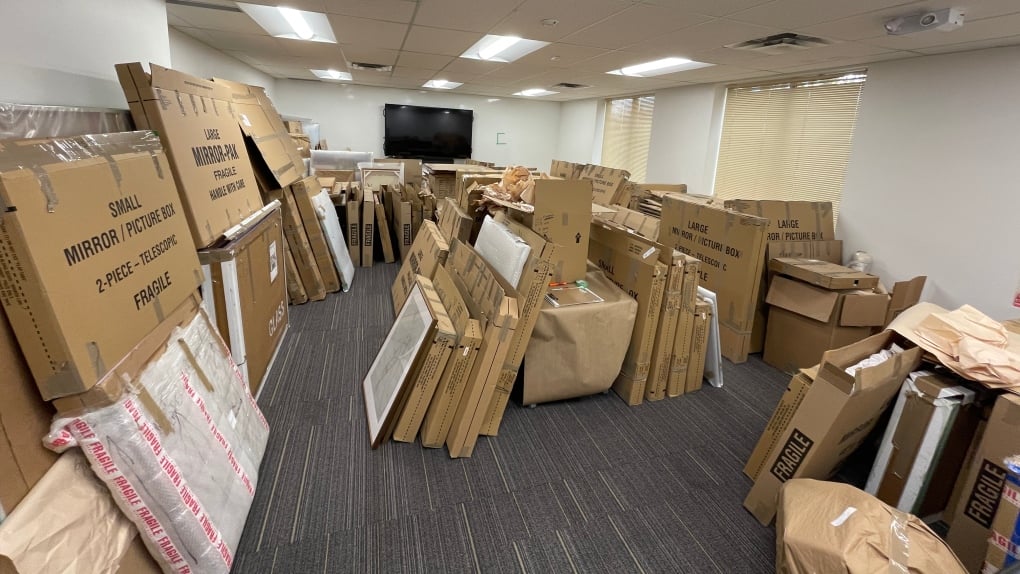Art
Vancouver real estate: Audain Art Museum loses appeal for tax exemption of $914000 Yaletown condo – The Georgia Straight

A $914,000 Vancouver condo used by employees of the Audain Art Museum is not exempt from taxation.
A B.C. Property Assessment Appeal Board reached this conclusion in a case involving a Yaletown apartment.
The Audain Art Museum is located in Whistler, and houses the collection of arts patron and property developer Michael Audain.
The Vancouver condo provides accommodation for museum staff when they are in the city.
The museum argued before the board that the two-bedroom and two-bath condo should be exempt from taxation by virtue of the Vancouver Charter.
The charter exempts from tax real property that is in “actual occupation by the incorporated charitable institution and is wholly in use for charitable purposes”.
In a decision and order, Kimberly Jakeman ruled that the museum’s use of the 787-square-foot Yaletown condo is “beyond the scope” of the organization’s stated charitable purposes.
These purposes involve the establishment of an art museum in Whistler, and to support the Audain Art Museum Foundation.
Jakeman related that the museum argued that its “purpose of purchasing a condo in Vancouver was to extend and build the Appellant’s presence in the prominent cultural hub of Vancouver”.
The charity claimed that while the museum is in Whistler, it “serves not only the local Sea to Sky residents and international travelers, but also Vancouverites and the people of British Columbia”.
It asserted that a presence in Vancouver is necessary to “cultivate connections with artists, sponsors, collectors and cultural partners”.
Jakeman also related that based on the museum’s evidence, the uses of the condo include “overnight stays in transit to other destinations like Paris, for example, or to attend meetings in Vancouver”.
“I find, however, that there is nothing in the stated charitable purposes which would allow me to conclude that owning and maintaining the Property in City of Vancouver is necessarily ancillary to further the charitable purpose,” Jakeman said.
The provincial assessor for the Vancouver Sea to Sky region argued that if a property is used by a charitable organization because it makes operational or business sense, it does not qualify for a tax exemption.
The assessor cited a case in Winnipeg in which a hospital claimed exemption for two apartments it acquired to house employees.
The low-cost housing served as an incentive for staff to join or remain with the Winnipeg General Hospital.
Jakeman recalled that a court of appeal in Manitoba referred to legislation similar in wording to the Vancouver Charter, and “found that the residence did not meet the test for an exemption”.
“It was an inducement to bring staff in, which was seen to be in keeping with a business purpose, but not a charitable use considering the charitable purpose of the hospital,” Jakeman wrote.
The same reasoning applies with the Audain Art Museum’s appeal.
“Holding the Property may make good business sense and can further the operation of the Appellant but it does not fall within the stated purpose of establishing, maintaining and building a collection of art in a museum in Whistler,” Jakeman wrote.
Jakeman also noted that the museum’s evidence that having the condo allows it to support the Audain Art Museum Foundation by attending meetings in Vancouver is “not necessarily ancillary to the stated purpose” of the charity.
“The Appellant can no doubt attend the meetings and support the Foundation without the Property,” Jakeman noted.
The condo is on the 23rd floor of the Bentley, a condo development by Polygon Homes.
Audain founded and chairs Polygon Homes.
According to the real-estate digital platform BC Condos and Homes, the 24-storey Bentley condo development features 146 units. The property was built in 2005.
Art
Calvin Lucyshyn: Vancouver Island Art Dealer Faces Fraud Charges After Police Seize Millions in Artwork

In a case that has sent shockwaves through the Vancouver Island art community, a local art dealer has been charged with one count of fraud over $5,000. Calvin Lucyshyn, the former operator of the now-closed Winchester Galleries in Oak Bay, faces the charge after police seized hundreds of artworks, valued in the tens of millions of dollars, from various storage sites in the Greater Victoria area.
Alleged Fraud Scheme
Police allege that Lucyshyn had been taking valuable art from members of the public under the guise of appraising or consigning the pieces for sale, only to cut off all communication with the owners. This investigation began in April 2022, when police received a complaint from an individual who had provided four paintings to Lucyshyn, including three works by renowned British Columbia artist Emily Carr, and had not received any updates on their sale.
Further investigation by the Saanich Police Department revealed that this was not an isolated incident. Detectives found other alleged victims who had similar experiences with Winchester Galleries, leading police to execute search warrants at three separate storage locations across Greater Victoria.
Massive Seizure of Artworks
In what has become one of the largest art fraud investigations in recent Canadian history, authorities seized approximately 1,100 pieces of art, including more than 600 pieces from a storage site in Saanich, over 300 in Langford, and more than 100 in Oak Bay. Some of the more valuable pieces, according to police, were estimated to be worth $85,000 each.
Lucyshyn was arrested on April 21, 2022, but was later released from custody. In May 2024, a fraud charge was formally laid against him.
Artwork Returned, but Some Remain Unclaimed
In a statement released on Monday, the Saanich Police Department confirmed that 1,050 of the seized artworks have been returned to their rightful owners. However, several pieces remain unclaimed, and police continue their efforts to track down the owners of these works.
Court Proceedings Ongoing
The criminal charge against Lucyshyn has not yet been tested in court, and he has publicly stated his intention to defend himself against any pending allegations. His next court appearance is scheduled for September 10, 2024.
Impact on the Local Art Community
The news of Lucyshyn’s alleged fraud has deeply affected Vancouver Island’s art community, particularly collectors, galleries, and artists who may have been impacted by the gallery’s operations. With high-value pieces from artists like Emily Carr involved, the case underscores the vulnerabilities that can exist in art transactions.
For many art collectors, the investigation has raised concerns about the potential for fraud in the art world, particularly when it comes to dealing with private galleries and dealers. The seizure of such a vast collection of artworks has also led to questions about the management and oversight of valuable art pieces, as well as the importance of transparency and trust in the industry.
As the case continues to unfold in court, it will likely serve as a cautionary tale for collectors and galleries alike, highlighting the need for due diligence in the sale and appraisal of high-value artworks.
While much of the seized artwork has been returned, the full scale of the alleged fraud is still being unraveled. Lucyshyn’s upcoming court appearances will be closely watched, not only by the legal community but also by the wider art world, as it navigates the fallout from one of Canada’s most significant art fraud cases in recent memory.
Art collectors and individuals who believe they may have been affected by this case are encouraged to contact the Saanich Police Department to inquire about any unclaimed pieces. Additionally, the case serves as a reminder for anyone involved in high-value art transactions to work with reputable dealers and to keep thorough documentation of all transactions.
As with any investment, whether in art or other ventures, it is crucial to be cautious and informed. Art fraud can devastate personal collections and finances, but by taking steps to verify authenticity, provenance, and the reputation of dealers, collectors can help safeguard their valuable pieces.
Art
Ukrainian sells art in Essex while stuck in a warzone – BBC.com
[unable to retrieve full-text content]
Ukrainian sells art in Essex while stuck in a warzone BBC.com

Source link
Art
Somerset House Fire: Courtauld Gallery Reopens, Rest of Landmark Closed
The Courtauld Gallery at Somerset House has reopened its doors to the public after a fire swept through the historic building in central London. While the gallery has resumed operations, the rest of the iconic site remains closed “until further notice.”
On Saturday, approximately 125 firefighters were called to the scene to battle the blaze, which sent smoke billowing across the city. Fortunately, the fire occurred in a part of the building not housing valuable artworks, and no injuries were reported. Authorities are still investigating the cause of the fire.
Despite the disruption, art lovers queued outside the gallery before it reopened at 10:00 BST on Sunday. One visitor expressed his relief, saying, “I was sad to see the fire, but I’m relieved the art is safe.”
The Clark family, visiting London from Washington state, USA, had a unique perspective on the incident. While sightseeing on the London Eye, they watched as firefighters tackled the flames. Paul Clark, accompanied by his wife Jiorgia and their four children, shared their concern for the safety of the artwork inside Somerset House. “It was sad to see,” Mr. Clark told the BBC. As a fan of Vincent Van Gogh, he was particularly relieved to learn that the painter’s famous Self-Portrait with Bandaged Ear had not been affected by the fire.
Blaze in the West Wing
The fire broke out around midday on Saturday in the west wing of Somerset House, a section of the building primarily used for offices and storage. Jonathan Reekie, director of Somerset House Trust, assured the public that “no valuable artefacts or artworks” were located in that part of the building. By Sunday, fire engines were still stationed outside as investigations into the fire’s origin continued.
About Somerset House
Located on the Strand in central London, Somerset House is a prominent arts venue with a rich history dating back to the Georgian era. Built on the site of a former Tudor palace, the complex is known for its iconic courtyard and is home to the Courtauld Gallery. The gallery houses a prestigious collection from the Samuel Courtauld Trust, showcasing masterpieces from the Middle Ages to the 20th century. Among the notable works are pieces by impressionist legends such as Edouard Manet, Claude Monet, Paul Cézanne, and Vincent Van Gogh.
Somerset House regularly hosts cultural exhibitions and public events, including its popular winter ice skating sessions in the courtyard. However, for now, the venue remains partially closed as authorities ensure the safety of the site following the fire.
Art lovers and the Somerset House community can take solace in knowing that the invaluable collection remains unharmed, and the Courtauld Gallery continues to welcome visitors, offering a reprieve amid the disruption.
-

 Sports19 hours ago
Sports19 hours agoArmstrong scores, surging Vancouver Whitecaps beat slumping San Jose Earthquakes 2-0
-

 News19 hours ago
News19 hours agoAs plant-based milk becomes more popular, brands look for new ways to compete
-

 News16 hours ago
News16 hours agoLabour Minister praises Air Canada, pilots union for avoiding disruptive strike
-

 News1 hour ago
News1 hour agoNova Scotia premier repeats calls for Ottawa to pay for protecting Chignecto Isthmus
-

 News1 hour ago
News1 hour agoEmir of Qatar to visit Ottawa on what will be his first official trip to Canada
-

 News1 hour ago
News1 hour agoTIFF audience prizes for ‘Life of Chuck,’ Hip doc; Rankin among Canadian winners
-

 News16 hours ago
News16 hours agoLooking for the next mystery bestseller? This crime bookstore can solve the case
-

 News19 hours ago
News19 hours agoInflation expected to ease to 2.1%, lowest level since March 2021: economists





















